 |
 |
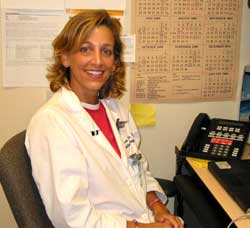
|
|
Karen Lynne Ullman, Radiation Therapist, Radiologic Technologists – Therapy (R.T.T.), Research Radiation Therapist, Radiation Oncology Branch, Center for Cancer Research, National Cancer Institute, National Institutes of Health, Bethesda, Maryland
|
1. I chose this career because...
2. My typical workday involves...
3. What I like/best least about my work...
4. My career goals are...
5. When I'm not working, I like to...
|
|
1. I chose this career because...
|
Back to Top

|
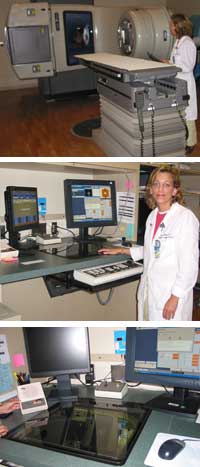
|
|
Karen Ullman demonstrates the set-up of the Linear Accelerator before a patient's treatment (top). Outside the treatment room, she uses a computer and monitor to operate the Linear Accelerator (center). A transparent desktop allows the radiation therapist to view the patient while undergoing treatment (bottom).
|
I chose to become a Radiation Therapist because after working for a year in the financial world, it was time for a career change. I was always interested in a medical career as both my parents are involved in medicine. My mother is a research nurse and my father is an anesthesiologist, so I was familiar with the medical world.
Growing up in Newport News, Virginia, I remember my family discussing medical topics around the dinner table. Glancing at my parents' medical textbooks piqued my interest at a very early age. In high school, I enjoyed all of my classes (English, Science, Math, Advanced Placement History) and was ready to pursue a liberal arts college education. I also knew that I wanted a smaller college and one that would allow me to travel and study abroad. I chose to attend Randolph Macon Woman’s College in Lynchburg, Virginia.
Choosing a Major for My Undergraduate Education
Like so many college students, I contemplated many majors (psychology, biology, politics) when I started college, but finally decided on politics. Though I enjoyed a human heredity biology class my freshman year, and considered a career in science, it was not the path I originally pursued. I graduated with a major in politics and a minor in economics. I had a wonderful junior year in England. I spent the entire year abroad studying subjects that pertained to my major and also many classes on the history and culture of Great Britain including art history and literature. It was truly a year I will never forget. I chose to major in politics, but later in life, I think that radiation therapy sort of chose me.
Catalysts to My Career Change: A Friend and A Visit
Upon graduation I returned to London, England and worked for 6 months in business. After that, I moved to Boston, Massachusetts and worked for a year at Putnam Investments. I was learning a great deal, and was even sponsored for a licensing exam that is required to sell mutual funds. I studied, took the exam and passed. I was happy, but not 100 percent. At times, I was thinking there was a job out there that was better suited for me. I contacted a woman from my college who had received a degree in radiation therapy from Labouré College in Boston. We had a very informative conversation about radiation therapy. That is when I decided to visit the radiation oncology department at Boston University Hospital. A visit to a radiation oncology clinic is actually required by Labouré College in order to enroll. To make a long story short, I fell in love with the radiation oncology atmosphere, the patient contact, and all aspects of the career. And that was only a 3-hour visit!
Radiation Therapy Education and Clinical Internship
I applied to the radiation therapy program at Labouré College and within 2 weeks I was saying goodbye to my friends at Putnam Investments and starting a new chapter in my life. During my 2 years of training, including both summers, I learned that the primary responsibilities of a radiation therapist included implementing treatment programs prescribed by a radiation oncologist, and assisting in the planning of treatment with the medical dosimetrist and the radiation physicist. The responsibilities required highly specialized technical skills, as well as, highly developed personal skills for interacting effectively with other members of the oncology treatment team, the patients and their families. I developed skills through an intensive didactic curriculum along with a clinical internship supervised by registered radiation therapists. Internship training was provided at clinical affiliates. After my training was complete, I was eligible to apply for certification through examination by the American Registry of Radiologic Technologists. I took and passed my exam.
My New Career Path
After completing my radiation therapy technology degree, I began my career at Brigham and Women’s Hospital and the Dana Farber Cancer Institute in Boston, Massachusetts. After two years in Boston, I moved to New York City, New York and worked at Memorial Sloan Kettering Cancer Center, first as a staff therapist and then as a senior radiation therapist. Then came the unique opportunity to become the research radiation therapist at the NCI in Bethesda, Maryland where I have been working ever since.
College Education
- Associate in Science, Radiation Therapy Technology, Labouré College (http://www.laboure.edu/home/), Boston, Massachusetts
- Bachelor of Arts, Politics, Economics Minor, Randolph Macon Woman’s College, Lynchburg, Virginia (http://www.rmwc.edu/)
Certification
Member
|
|
2. My typical workday involves...
|
Back to Top

|

|
|
Karen Ullman stands next to a CT scanner, equipment used which provides data that is helpful in planning a patient's radiation therapy (top). An immobilization mask is prepared for each patient and is used throughout the patient's treatment (center). Karen prepares for a CT scan using a model of a patient's head (bottom).
|
My typical workday involves working with other radiation therapists to treat cancer patients.
Radiation therapists are responsible for scheduling patients. We treat patients every 15 minutes. Radiation therapists also operate the Computer Tomography (CT) scanner (http://www.nlm.nih.gov/medlineplus/ency/imagepages/1088.htm) that is used to plan the patient’s radiation therapy (http://www.nlm.nih.gov/medlineplus/radiationtherapy.html). The CT scanner allows us to view images of the patient’s tumor(s) and other internal tissues and organs. A patient is usually treated Monday to Friday for 5 to 7 weeks. There are times when the treatment is shorter.
My Responsibilities
- Positioning the patient for radiation treatment
- Operating the Linear Accelerator, the equipment that is used to deliver the radiation
- Preparing the patient’s radiation therapy chart
- Maintaining daily records of treatment
- Participating in quality assurance reviews of all the patients
A Collaborative Team Works for Patient Care
The goal of radiation therapy is to kill the cancer cells with as little risk as possible to normal cells. Members of our radiation oncology department work together to treat our patients. This collaborative effort is seen and felt by all, including the patient, family members, and friends.
Members of Our Radiation Oncology Team
- Radiation Oncologist – a physician who specializes in using radiation to treat cancer and prescribes the type and amount of treatment that is suitable for the patient.
- Radiation Physicist – a physicist that works on the quality assurance of the Linear Accelerator (machine that delivers radiation therapy). They are responsible for making sure that the machine delivers the correct amount of radiation. They work closely with the physician to plan the patient’s treatment.
- Dosimetrist – a member of the team who works under the direction of the physician and the radiation physicist and helps to carryout the treatment plan by calculating the amount of radiation to be delivered to the cancer and normal tissues that are nearby.
- Radiation Oncology Nurses – registered nurses who coordinate patient care. Along with radiation therapists, they are responsible for patient education and managing patient’s side effects due to the radiation treatments.
- Support Staff – staff who welcome our patients and are responsible for making the daily operations flow smoothly.
Expanding My Role in Research
During the last few years, I have worked as a research radiation therapist. In addition to my regular responsibilities, I also work with specific physicians to help develop and implement their research protocols. My new position allows me the opportunity to maintain patient contact and broaden my knowledge as a radiation therapist. Currently, I am submitting a manuscript for publication in a professional journal. I have participated in national meetings by speaking and submitting abstracts of my work. I have also collaborated with other research radiation therapists in Canada and Ireland.
|
|
3. What I like/best least about my work...
|
Back to Top

|
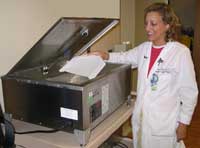
|
|
Karen Ullman places material for modeling a patient's head into a heated water bath so that it can be used to make an immobilization mask.
|
What I like best about my work is patient contact. I often say that it’s rare to have a profession where you can hug your patients. I truly think we make the radiation oncology process a lot easier and less complicated for patients and their families. Radiation therapists, as well as the entire department, are vital in making a very difficult situation much easier. We allay fears by educating the patients and by providing support for him/her and the family. I find that this is the most rewarding aspect of the profession.
What I like least about my work can be related to the answer I give to people who ask, “Is your job depressing?” I often tell people that I wish there were a cure for cancer and that a radiation therapy profession did not need to exist. I would gladly find another job if a cure was found. Unfortunately, this is not the case. I realize that if one has to fight cancer, it’s best to make the situation as tolerable as possible. Many of our patients are upset when the treatment ends, as they are used to seeing the department members on a daily basis. We become like family and they are quick to remind us that all things considered, we did make an unpleasant situation very pleasant.
|
|
4. My career goals are...
|
Back to Top

|
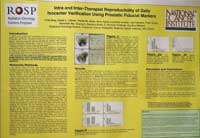
|
|
Pictured is a poster depicting the research Karen Ullman and her NCI colleagues performed, and which she presented at an annual American Society for Therapeutic Radiology and Oncology meeting.
|
My career goals are to become more involved in protocol writing, perhaps becoming a principal investigator (PI) on a protocol. A protocol is a study plan on which all clinical trials are based. The protocol is carefully designed by a PI to safeguard the health of participants and answer specific research questions. Since my time at the NCI, I have been an associate investigator (AI) for several protocols. While I am very proud of my achievements, other goals and opportunities exist. Research as a radiation therapist is a challenging new frontier. It gives us the opportunity to use other skills so that we are able to work closely with other disciplines. Our input is valued and important.
|
|
5. When I'm not working, I like to...
|
Back to Top

|
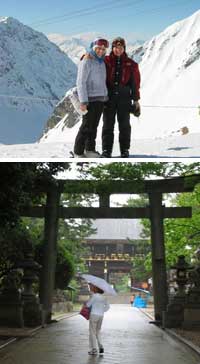
|
|
Karen Ullman (pictured with an NCI colleague) enjoyed skiing in Lugano, Switzerland, before attending a professional meeting (top). She does a little sight seeing in Kyoto, Japan, where she attended a meeting of the International Society for Magnetic Resonance in Medicine (bottom).
|
When I’m not working, I love reading, traveling, running, walking, and spending time with friends and family. I have had the pleasure of representing and speaking on behalf of the NCI’s Radiation Oncology Branch at many professional meetings. The meetings are not only informative, but they allow me the opportunity to travel – something I have always loved!
|
|
|
|
 |